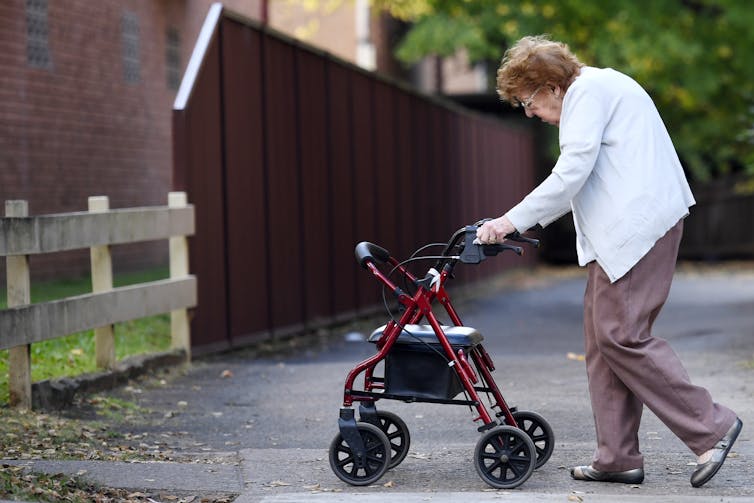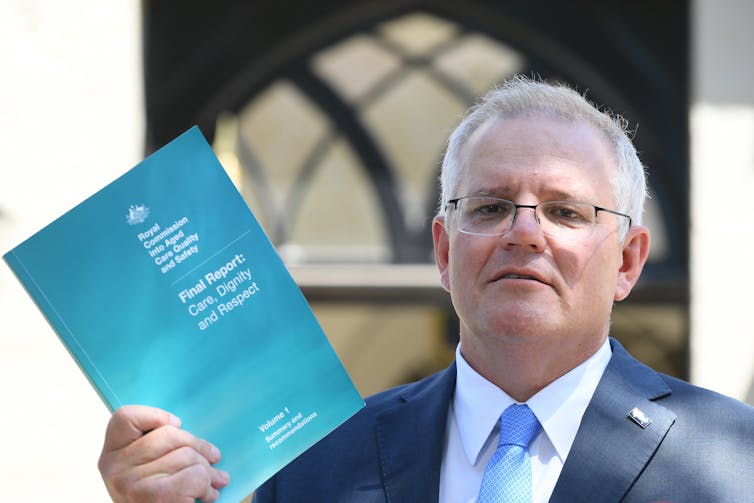50% of Australians are prepared to pay more tax to improve aged care workers' pay, survey shows
- Written by Rachel Milte, Matthew Flinders Senior Research Fellow, Flinders University
The final report from the aged care royal commission this week was damning. Speaking of a system in crisis, it calls for an urgent overhaul.
The Morrison government has been facing difficult questions regarding which of the 148 recommendations it will adopt. It also needs to grapple with how to pay for the much-needed changes.
Read more: 4 key takeaways from the aged care royal commission's final report
On this question, the royal commissioners disagree. Commissioner Lynelle Briggs calls for a levy of 1% of taxable personal income, while commissioner Tony Pagone recommends the Productivity Commission investigate an aged care levy.
A 1% levy could cost the median person who already pays the medicare levy about $610 a year, while boosting funds for the aged care sector by almost $8 billion a year.
So far, the government has played down the idea of new taxes. There is a view this would be hard sell for a Coalition elected, at least in part, to lower taxation.
But as debate continues about how to make the changes we need to aged care (and not just talk about it), our research suggests many Australians support a levy to improve the quality and sustainability of our aged care system.
Our research
In September 2020, we surveyed over 1,000 Australians aged 18 to 87 years, representative by age, gender and state. We wanted to find out how the pandemic influenced attitudes to health, well-being and caring for others.Our findings indicated overwhelming public support for aged care reform, to ensure all older Australians are treated with dignity.
Read more: Paid on par with cleaners: the broader issue affecting the quality of aged care
The vast majority of our respondents (86%) either “strongly agreed” or “agreed” Australia needed more skilled and trained aged care workers. On top of this, 80% thought aged care workers should be paid more for the work that they did.
More than 80% also either “strongly agreed” or “agreed” that nurses working in aged care should be paid at an equivalent rate to nurses working in the health system. Currently, nurses working in aged care are paid, on average, about 10-15% less.
The crunch point
Importantly, 50% of our respondents showed a willingness to pay additional tax to fund better pay and conditions for aged care workers. Of those willing to pay more tax, 70% were willing to pay 1% or more per year.
 Australians want to see more skilled aged care workers and for them to receive better pay.
Paul Miller/AAP
Australians want to see more skilled aged care workers and for them to receive better pay.
Paul Miller/AAP
This finding supports previous larger-scale research we undertook for the royal commission, before the pandemic.
Here we found similar levels of public support for increased income tax contributions to support system-wide improvements. This suggests politicians seem to underestimate the public appetite for improvements to the system, and people’s willingness to contribute to achieve this.
Changing ideas about economic ‘success’
Our survey findings also highlighted a growing recognition among Australians of the importance of a broader range of social and economic goals.
For some time, economists, academics, organisations and peak bodies have been calling for a move away from traditional economic indicators (such as economic growth and expanding gross domestic product) at any cost, towards a broader definition of success.
This would see governments focus on policies that promote a more equal distribution of wealth and well-being, where the fundamentals of community cohesion are highly valued and our natural resources are protected.
We asked our survey respondents to rank the relative importance of seven key areas of public policy in framing Australia’s pathway to recovery from the COVID-19 pandemic, including:
- dignity (people have enough to live in comfort, safety and happiness)
- nature and climate (a restored natural world which supports life into the future)
- social connection (a sense of community belonging and institutions that serve the common good)
- fairness (equal opportunity for all Australians and the gap between the richest and the poorest greatly reduced)
- participation (having as much control over your daily life as you would want)
- economic growth (an increase in the amount of goods and services produced in Australia), and
- economic prosperity (full employment and low inflation levels).
The criteria ranked most important by the largest proportion of our survey respondents were dignity (20.1%) and fairness (19.3%).
Traditional economic indicators were not the highest priorities for the Australians we surveyed. Instead, economic growth and prosperity were only ranked as a top priority by 15.3% and 15.2% of our respondents respectively.
This suggests the general public recognises the importance of moving beyond the traditional markers of a successful society.
What Australians want
Our research shows significant aged care reform is entirely consistent with the current priorities of the Australian public.
 The Morrison government says it will respond fully to the report in the May 11 federal budget.
Dean Lewins/AAP
The Morrison government says it will respond fully to the report in the May 11 federal budget.
Dean Lewins/AAP
The burning question now is whether the Morrison government will step up to the challenge.
Authors: Rachel Milte, Matthew Flinders Senior Research Fellow, Flinders University





